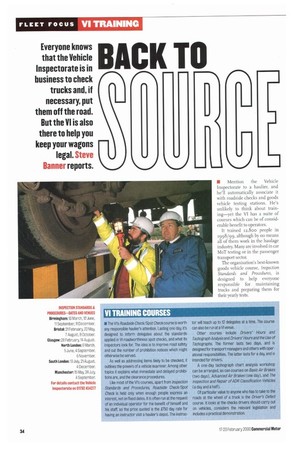VI TRAINING COURSES
Page 36

If you've noticed an error in this article please click here to report it so we can fix it.
• The VI's Roadside Check/Spot Checkcourse is worth any responsible haulier's attention. Lasting one day, it's designed to inform delegates about the standards applied in VI roadworthiness spot checks, and what its inspectors look for. The idea is to improve road safety and cut the number of prohibition notices which might otherwise be served.
As well as addressing items likely to be checked, it outlines the powers of a vehicle examiner. Among other topics it explains what immediate and delayed prohibitions are, and the clearance procedures.
Like most of the VI's courses, apart from Inspection Standards and Procedures, Roadside Check/Spot Check is held only when enough people express an interest, not on fixed dates. It is often run at the request of an individual operator for the benefit of himself and his staff, so the price quoted is the £750 day rate for having an instructor visit a haulier's depot. The instruc tor will teach up to 12 delegates at a time. The course can also be run at a VI venue.
Other courses include Drivers' Hours and Tachograph Analysis and Drivers' Hours and the Use of Tachographs. The former lasts two days, and is designed for transport managers and others with operational responsibilities. The latter lasts for a day, and is intended for drivers.
A one-day tachograph chart analysis workshop can be arranged, as can courses on Basic Air Brakes (two days), Advanced Air Brakes (one day), and The inspection and Repair of ADR Classification Vehicles (a day and a half).
Of particular value to anyone who has to take to the roads at the wheel of a truck is the Driver's Defect course. It looks at the checks drivers should carry out on vehicles, considers the relevant legislation and includes a practical demonstration.








































































































